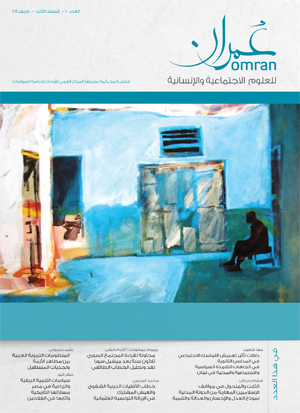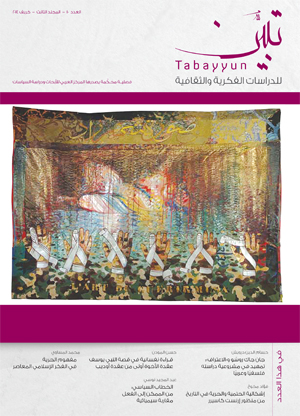The tenth editions of both Omran and Tabayyun were published in October, 2014. To read brief descriptions of the tables of contents of these two editions, click on the links below for: Omran and Tabayyun. The ACRPS Bookstore, where copies of all of the Center's publications can be purchased, can be found here.

Omran 10: Contents
The Arab Center for Research and Policy Studies (ACRPS) has published the tenth edition of Omran, a quarterly journal devoted to the social sciences and humanities. Articles in this Fall 2014 edition include: “Social cohesion in Lebanon’s Secondary School Curriculum: Effects on Students’ Attitudes”, by Maha Shuayb, who examines the current approaches to bolster social cohesion within Lebanese secondary schools, and the results these practices have had on secondary school students’ attitudes. Hicham Khabbashe contributes “Moroccan Islamists on the Civil State: Case of the Justice and Charity Party and the Justice and Development Party”, in which he examines Morocco’s two main Islamist parties’ attitudes towards the modern civil state, and the extent to which members of the respective parties are willing to change their attitudes on the notion of a civil state.
In “A Reading on Syria: Deconstructing Syrian Discourse”, Jerome Maucourant and Akram Kachee provide a critique of the large body of orientalist work brought to the fore by the Syrian revolution, whilst carefully underlining the revolutionary streams running through Syria’s history. Mohamed Merimi’s “The Oral Discourse of Religious Minorities and Coexistence in the Ottoman Tunisia” portrays the local history of the Tunisian island of Djerba, specifically focusing on the oral history of its numerous ethnic communities. Merimi’s paper seeks to understand the social relations codified within the narratives of oral history, and determine when and how these relationships move from oral history to becoming codified in written form. In “Arab Educational Systems: Current Crisis and Future Challenges” Rachid Jaramouni argues that the failure of education and training systems in the Arab world is not only linked to weak financial or logistical capacity, or the lack of human resources, but primarily due to the absence of a clear development vision. Jarmouni concludes that, at its core, the crisis of Arab education takes shape in the inability of educational institutions to carry out their civilizational missions and pioneering work. Saqr al-Nour‘s “Rural Development and Agricultural Policies in Egypt: Historical Roots and the Effects on Farmers”, relies on an analytical reading of the historical evolution of Egypt’s rural and agricultural development laws, and the impacts these have had on Egypt’s countryside and Egyptian farmers.
In the regular section dedicated to translated works, this issue of Omran includes “Colonial States as Intelligence States: Security Policing and the Limits of Colonial Rule in France’s Muslim Territories, 1920-40”, originally published in French by Martin Thomas. Also included in this tenth edition are “From Post-colonial State to a Just, Democratic Social Welfare State: The Historical and Social Negotiations and the Paths of Change for Tunisia”, by Murad Dayyani as well as a review of Asef Bayat’s Life as Politics: How Ordinary People Change the Middle East jointly written by Sari and Anas Hanafi. ACRPS’s Inaam Charaf contributed a review of Aleppo and its Territories: the Industry and Politics of a City, 1868-2011, a compendium published by the French Institute for the Near East in 2014. Ahmad Mohammed Salem presents a critique of Excavating the Legacy of Ibn Khaldun: the Salafi Roots and the Illusion of Arab Modernity, by Najia al-Warimi. Finally, Ziad Mona provides a review of a number of recent publications with relevance to the Arab world, including: Ervand Abrahamian’s A History of Modern Iran; Control Food, Control People: the Struggle for Food Security in Gaza, by Rami Zurayk and Anne Gough; Nader Srage’s Revolution and the Slogans of Egyptian Youth, published recently by the ACRPS; and Kristian Coates Ulrichsen’s The First World War in the Middle East.

Tabayyun 10: Contents
The Arab Center for Research and Policy Studies (ACRPS) has released the tenth edition of Tabayyun, a quarterly journal devoted to cultural studies and philosophy, the editorial board of which is chaired by ACRPS Director Azmi Bishara. This latest Fall 2014 edition opens with an essay by Hussam al-Din Darwish on “Jean-Jacques Rousseau’s ‘Confessions’: a Subject for Philosophical Investigation in the Arab World”, in which he investigates Rousseau’s confessional theory and its relevance to the Arab context. Darwish explores the contemporary weight of Rousseau’s philosophical theories, paying particular attention to his ideas on confession and justice. In a thought-provoking article, Hassan al-Mouden applies psychoanalysis to religious scriptures in “A Psycho-Analytical Reading of the Story of Joseph: Before Oedipus, a Brotherhood Complex”, in which he attempts to present a different interpretation of the story of Joseph. Al-Mouden offers an in-depth psycho-analytical perspective and questions the possibility for other types of personality complexes to emerge through the study of alternative texts than those previously studied by the founders of psychoanalysis.
The notion of ‘freedom” features as a central argument in this latest edition of Tabayyun, with Mohammad al-Masawi’s “The Concept of Freedom in Cotemporary Islamic Thought” offering a critical reading of the centrality of freedom in the discourse of the contemporary Islamic world, particularly as it relates to the political and ideological realms. Al-Masawi notes how “freedom” is one of the most widely used words in the political lexicon within the Islamic world, albeit the meaning of which changes in accordance with the motivation behind its use. In “The Problem of Determinism ad Freedom in History from the Perspective of Ernst Cassirer”, Mohammad al-Masawi poses a number of questions which challenge the German philosopher Ernst Cassier in the latter’s understanding of the scientificism of history as a discipline, and its relationship to both free will and determinism. Makhouh specifically looks into the epistemological problem of creating historical knowledge from events that have transpired. Finally, Abdul Majid Nosy’s “Political Speech, from Possibility to Action: a Semiotic Approach” analyzes the contents of the Palestinian declaration of independence made in Algiers on November 15, 1988. The author makes use of rhetorical semiotics to analyze the key components of the speech’s structure and organization, as well as the techniques used to convey the vision of the declaration.
In the regular “From our Bookshelf” section, devoted to global classics and translations, Wael Ali provides a translation of an Umberto Eco essay on death, while Abdul Nabi Hamani provides a reading of Tammam Hassan’s new approach to Arabic grammar. Also included in this section is “Al-Jaberi: from the State in Islam through Concept and History”, by ACRPS Researcher Chamseddine Kilani; and “The Internationalization of Arabic Literature, from Naguib Mahfouz’s Nobel Prize in Literature to the Yacoubian Building”, by Richard Jackman; as well as Mohammed Malakh’s “The Epistemological Approach in Modern Arabic Linguistics”. Finally, ACRPS researcher Elnour Hamad provides readers with an examination of the works of John Gray, in “John Gray and Philosophy from a Different Perspective: a Short Trip through His Work”.